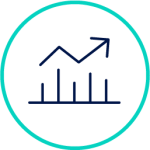EU Taxonomy
The EU Taxonomy is a classification system for sustainable economic activity, the main goal of which is to direct investments in a direction that is more sustainable in terms of the climate and the environment.
Taxonomy is EU’s responsibility tool, which enables companies to plan and direct their activities towards activities that promote the goals of sustainable development.
The climate and environment assessment criteria of the EU Taxonomy are further developed and renewed. The Taxonomy’s classification system and reporting requirements will apply to an increasingly large number of European companies in the future, when the sustainability reporting directive CSRD (Corporate Sustainability Reporting Directive) becomes applicable and at the same time replaces the NFRD’s obligations.
To whom: In addition to financial market participants, the EU Taxonomy regulation applies to large companies that annually publish a report on non-financial information as part of their annual report in accordance with the NFRD (Non-Financial Reporting Directive).
The EU Taxonomy is constantly being developed and the classification system and reporting requirements will apply to most other companies when the sustainability reporting directive CSRD (Corporate Sustainability Reporting Directive) becomes applicable and at the same time replaces the obligations of the NFRD.
For questions regarding EU Taxonomy contact:

Henrik Österlund
+358 (0)20 756 9457
Sustainability reporting
Why: Starting in 2024, the EU’s Corporate Sustainability Reporting Directive (CSRD) imposes legal obligations on companies to report matters related to responsibility and sustainable operations. The goal of the regulation on sustainability reporting is to make the responsibility actions of companies more transparent and the reported information more comparable.
In terms of the company’s operations, effects and risks, ESG information, i.e. information about the environment (E – environment), social responsibility (S – social) and governance (G – governance), is published in accordance with the new EU reporting standards in the sustainability report as part of the activity report.
The annual sustainability report describes strategy, business, management skills and participation, practices and processes, goals and indicators (KPI) related to sustainability topics. In accordance with the double materiality principle, the company’s impact on the environment and society, as well as the impact of sustainability factors, risks and opportunities for the company are reported.
In order to ensure reliable information, the information in the sustainability reports must be verified by an independent inspector in the future.
To whom: In Finland, CSRD obligations apply to at least 700 companies and in Europe to more than 50,000 companies. The statutory reporting obligation initially applies to listed companies employing more than 500 people, which must publish their sustainability report as part of the 2024 annual report. From 2025, CSRD obligations cover all large companies that meet 2/3 of the following conditions: more than 250 employees, turnover of at least €40 million, balance sheet of at least €20 million.
Smaller companies will also join in stages. Even smaller companies should be aware of the requirements of the new reporting obligations at an early stage, because through the supply chains, the regulatory obligations also extend to those who are not yet directly covered by statutory reporting obligations.
Contact us regarding sustainability reporting:

Henrik Österlund
+358 (0)20 756 9457
Science-based Targets Climate and Nature
Why: The purpose of the international ScienceBasedTargets initiative is to promote climate action in the private sector by helping companies set science-based and sufficiently ambitious targets for their own operations.
The SBT initiative sets clear action guidelines for companies to target reduction of greenhouse gas emissions in the company’s business. These measures help prevent the worst effects of climate change and support the growth of climate-friendly business.
Joining the SBT initiative requires the company to commit to the initiative, calculate the company’s carbon footprint in accordance with the GHG protocol, and set credible and ambitious emission reduction goals.
Science-basedtargets for Nature is a new initiative published by the Science Based Targets Network (SBTN) whose purpose is to promote the protection of natural diversity in the private sector by helping companies to identify and reduce impacts on nature in a targeted manner.
Who: For you who want to promote and optimize your company’s climate and nature initiatives.
Contact us regarding SBT matters:

Henrik Österlund
+358 (0)20 756 9457
Climate scenarios and risks
Why: Climate scenarios, -assessments of risks and vulnerabilities are required from companies to an increasing extent in legislation. They are required, among other things, in the gradually coming into force EU Taxonomy Regulation and in the future requirements for sustainable development reporting (CSRD, Corporate Sustainability Reporting Directive).
For whom: You who want to prepare for the future in time, develop your business to success and meet the requirements of your customers, investors and other important stakeholders as well as legislation.
In addition, we help municipalities and cities in future-oriented climate assessments and climate change adaptation planning.

Henrik Österlund
+358 (0)20 756 9457
Biodiversity
Why: The diversity of nature, i.e. biodiversity, refers to the spectrum of life, both in the abundance of species, the diversity of species’ inheritance, and the diversity of species’ habitats. The more diverse our living environment is, the more resistant it is also against natural disasters and man-made disturbances. Until now, however, biodiversity has been depleted at an alarming rate around the world, especially due to strong economic growth. The deterioration of biodiversity also reduces people’s well-being, as it, for example, worsens food self-sufficiency and increases risks related to health and well-being.
For whom: Both companies and individuals have an obligation to change their operations in a more climate-friendly direction. Companies often have more opportunities for influence than individuals, and thus companies can act as significant solvers of the climate crisis.
Contact us regarding biodiversity:

Henrik Österlund
+358 (0)20 756 9457
Environmental Impact Assessment
Why: The EIA Act (252/2017) stipulates when the EIA procedure is applied to the project. The ELY center can also require an EIA procedure in individual cases with a separate decision. For larger projects, the assessment of the need for an EIA should always be done before the application for an environmental permit, so that the need for an EIA is known. Certain projects, such as chemical industry facilities, bioproduct factories or wind farms, always require an EIA procedure.
The EIA also serves as planning support, as it can be used to prevent harmful environmental effects and implement the project more responsibly. As part of the EIA procedure, environmental surveys are often carried out and residents’ workshops are held, where the residents of the surrounding area can participate in the implementation of the project. A well-prepared EIA contributes to the realization of the project.
For whom: For you, who are responsible for your company’s projects and environmental impact management.
Contact us regarding EIA:

Masi Mailammi
+358 (0)20 756 2300
Substitution of chemicals
Why: Chemical users in companies and consumers who use different products are exposed to different chemicals and different chemicals also end up in the environment. Harmful chemicals can endanger human health and be dangerous to the environment. Chemical legislation sets various restrictions on the most harmful chemicals. The restriction may be a ban on use, the concentration of the substance may be limited, or continuing use may require fulfilling various complex obligations. Information about chemicals and their harmfulness increases all the time, and new substance restrictions are given along with it. This requires constant monitoring from companies. The new restrictions cause companies to need to replace substances in their products and processes.
For whom: Monitoring substance restrictions and their effects is the responsibility of all companies that manufacture chemicals and objects and that use chemicals. Companies need to know their products and, if necessary, replace the chemical.
Contact us regarding the replacement of chemicals:

Anne Kallioinen
+358 (0)20 756 2303



